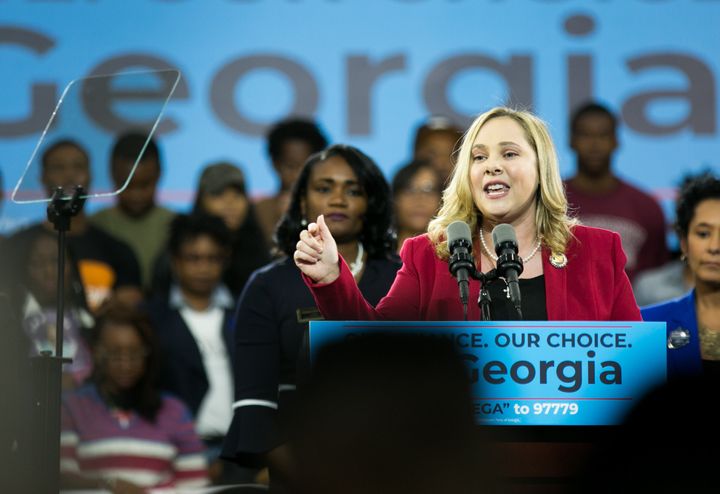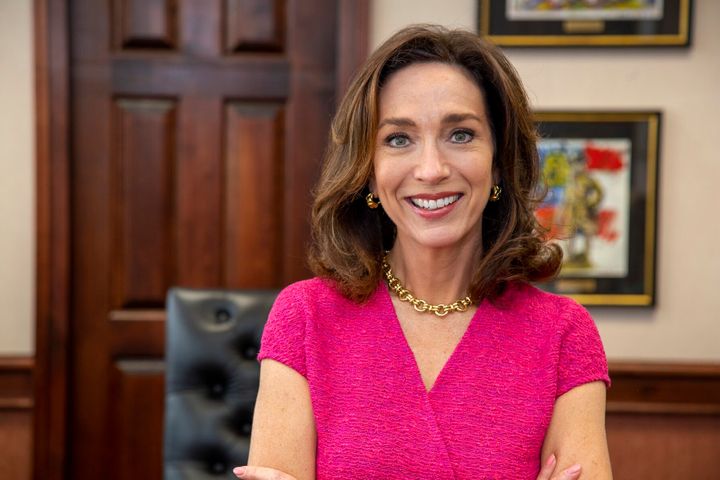[ad_1]
You may not have heard much about them, but two viable, progressive candidates are running to unseat Sen. David Perdue (R-Ga.) in 2020 and both have a shot at making history as the state’s first elected female senator.
Sarah Riggs Amico, an executive at a family-run trucking company, ran for lieutenant governor last year alongside Stacey Abrams’ historic bid for governor. Amico didn’t win, but she came relatively close and ― as she’ll happily point out ― got way more votes than Perdue did when he won his Senate seat in 2014.
Teresa Tomlinson, an attorney, was the twice-elected mayor of Columbus, the state’s second-largest city and a majority-minority community. During her eight years in office, she was named six times to Georgia Trend Magazine’s “100 Most Influential Georgians” list and led Columbus to be rated one of the “25 Best Run Cities in America” by WalletHub, a Washington-based finance website.
Both have shown they can fundraise. Both have picked up key endorsements. Both have a clear policy platform and a strategy for appealing to voters in Democratic and Republican parts of the state. Neither is getting much national attention. Why is that?
It’s partly because the field is wide open in this Senate Democratic primary, which isn’t until May 19. It’s partly because another candidate in the mix, filmmaker Jon Ossoff, already benefits from national name recognition from his high-profile but unsuccessful House bid in 2017. But it’s also because national groups like the Democratic Senatorial Campaign Committee and EMILY’s List are still watching to see if it’s worth investing in a real fight in Georgia, where Democrats have teetered on the edge of winning a statewide election for years but fallen just short every time.
“Georgia has been like the Lucy’s football of American politics,” said Jeffrey Lazarus, a political science professor at Georgia State University. “Time and time and time again, Democrats have been getting 46, 47, 49%, going back to 2000 in Senate races and governor’s race. … Demographically, it does look like any year now it could be the time when a Democrat wins.”
Amico and Tomlinson insist that Georgia is ripe for a Democratic victory next year, saying a mix of factors give the party an edge: the state’s rapidly changing demographics around Atlanta, where the population is diversifying and threatening the GOP’s grip on power; the “Stacey Abrams phenomenon,” as Tomlinson put it, meaning Democratic voters are still fired up after she nearly won last year’s governor’s race; and the fact that both Senate seats are open in 2020 and neither will be held by a longtime Republican anymore.
Perdue has only been in his seat for one term after former Republican Sen. Saxby Chambliss held it for 12 years. Republican Sen. Johnny Isakson, who is in his third term, is retiring at the end of this year, leaving his seat open for a special election in 2020. The outcomes in both Senate races could help determine which party controls the chamber.
Democrats remain the underdogs here, of course. The Cook Political Report rates Perdue’s seat “likely Republican.” Larry Sabato’s Crystal Ball rates it the slightly more tenuous “leans Republican.” Perdue also has a whopping $6.3 million cash on hand, a formidable hurdle for anyone taking him on.
But neither of those details means Perdue has a lock on his seat. He has closely aligned himself with President Donald Trump, whose approval rating has stayed underwater in multiple Georgia polls. New voters have registered in droves since 2018, and many are racial minorities or under the age of 30 ― both groups more likely to support Democrats than Republicans. And for all the money Perdue has in the bank, he still brought Trump to Atlanta last month to host a big-ticket fundraiser for him, a sign of at least some uneasiness about his path ahead.
Trump also set up a joint fundraising committee with Perdue, making him the first Senate incumbent to directly receive support from a Trump-backed fundraising committee.
In separate interviews with HuffPost, Amico and Tomlinson laid out why they’re running, how they plan to connect with voters in conservative areas and why they see Perdue as vulnerable in a state where a Democrat hasn’t won a Senate election in 19 years.

Sarah Riggs Amico
“How many Democrats do you know who launched with a video about faith featuring gay couples and trans activists and abortion rights?”
That’s Amico, boasting of her Senate campaign launch video in August. In it, she talks about her progressive Christian faith and how it shapes her views on matters ranging from social justice to economic security to running a company. The video also features hugs from Abrams and former President Barack Obama during her 2018 campaign.
A self-described suburban mom and political outsider before last year’s bid for lieutenant governor, Amico said she learned from her intense race for lieutenant governor that most Georgians don’t see themselves as Democrats or Republican as much as they are looking to connect with leaders on everyday issues.
That’s one way that Perdue is vulnerable, she said. He hasn’t held a single town hall since he took office in early 2015. In the meantime, Amico said she’s traveled to 150 counties and sat in 150 counties’ worth of living rooms, talking with voters in rural and urban areas about issues like health care, LGBTQ rights, business leadership and faith.
“They don’t want to hear your philosophy on government. They want to know if you can fix the problems they worry about when the kids are asleep and they’re sitting on the couch watching Netflix or the news, and God help them, looking at what’s happening in this country,” she said. “That’s where we fight.”
Bless his heart, it’s not going to fly.
Sarah Riggs Amico on Sen. David Perdue trying to knock her business experience.
Amico and Perdue have both led companies through tough economic times, and both have filed for bankruptcy in the past. She said how they each responded to the situation presents “two visions of capitalism”: Perdue laid off 7,650 people as CEO of Pillowtex, a failed textile company, while Amico gave up her equity as executive chairwoman of Jack Cooper Ventures, the family-run trucking company, to save thousands of jobs and health benefits. The company, one of just two unionized car fleets, cited difficulty competing with its mostly non-unionized competition as the reason for its bankruptcy filing.
“The contrast between our business experience is stark and not in his favor. The contrast is even better if he tries to make the ‘socialism’ argument against me, a former trucking company owner and Harvard MBA,” she said. “Bless his heart, it’s not going to fly.”
Amico is the only Democratic candidate who has previously run a statewide campaign ― and did she mention that she got more than 1.8 million votes when she ran for lieutenant governor? That’s 400,000 more votes than Perdue got when he won his 2014 Senate race.
“I’m starting from a hell of a base to give him a run for his money,” she said.

Teresa Tomlinson
“I actually believe I’m the only candidate who can beat David Perdue.”
An eighth generation Georgian, Tomlinson has come a long way from seven generations of her family living in “rank, rural poverty,” as she put it. She describes her mom growing up so poor that she and her six siblings were farmed out to friends’ and relatives’ houses when their parents couldn’t afford to feed them. If it wasn’t for the government adopting strong economic policies at the time Tomlinson was growing up in Atlanta ― policies that strengthened her mom’s union protections in her job at a meat department in a grocery store ― she says she wouldn’t have been able to go to college and law school.
“I say all the time, ‘Government is the framework in which we live our most prosperous life,’” she said. “And that’s why I’m here today.”
Tomlinson is leaning on her success as mayor and her rural roots to connect with voters in central and south Georgia, a stretch of the state where her family has deep ties but where Democrats don’t usually campaign. She gave a nod to Georgians in rural areas last month by launching her campaign headquarters in Columbus instead of Atlanta, where major statewide candidates generally set up camp.
But wooing rural voters isn’t her only strategy. Tomlinson is going all-in on courting African American voters.
Racial and economic justice are a central focus of her platform. She said she built inroads with the African American community during her eight years running Columbus. She’s also picked up endorsements from prominent black leaders in Georgia, ranging from lawmakers to former U.S. ambassador to the United Nations Andrew Young, baseball legend Hank Aaron and human rights activist Joe Beasley.
And putting her philosophies into practice, her campaign’s entire executive team is African American women.
“They bring a perspective that is wildly underrepresented in campaigns and policy,” she said. “The pragmatic need to respond to the people that you’re asking to make this decision, that’s how it came about. I will say too, they are all also of another generation. So this is the future of Georgia politics right here. This campaign. It reflects it.”
That certainly lends itself to a statewide run: 63% of the electorate in the Democratic primary is African American voters, she said, of which 70% are women.
“When you want justice, you go to some African American voters. They have a 400-year history of being able to understand where justice and injustice lie,” Tomlinson said. “I have been making sure that when I’ve had the opportunity to govern and now lead this campaign, that what I’m doing reflects that relationship with the African American community. I’m very conscious of it.”
When you want justice, you go to some African American voters. They have a 400-year history of being able to understand where justice and injustice lie.
Teresa Tomlinson
Tomlinson is smart to highlight the relationships she forged with leaders in the Black community as mayor, said Howard Franklin, an African American Democratic strategist based in Atlanta. He noted that she was the only Senate Democratic candidate who attended a Congressional Black Caucus gathering in Washington in the fall.
“Having served before is a big leg up,” said Franklin. “Columbus is the second-largest city. Eight years. It means you have to meet with all the legislative leaders, which is different than meeting them as a candidate.”
Tomlinson sees plenty of vulnerabilities in Perdue. He’s stood by Trump amid the president’s prolonged trade war with China, even as Georgia’s farmers have suffered. He didn’t use his influence to expedite long-delayed federal relief for Hurricane Michael, which badly hurt the state. (Perdue blamed Democrats, not Republicans, for holding up that aid.) And, of course, Perdue doesn’t hold town halls, which Tomlinson said fuels his status as “remote” and “amazingly absent.”
That alone, she added, is grounds for replacing him.
“His whole demeanor is antithetical to the fiduciary concept of representing people in a public service position,” Tomlinson said. “He’s been a complete failure as a Georgia representative.”
Perdue spokeswoman Casey Black said the lawmaker is proud of his Senate record and defended his role in securing disaster relief and agreement on a new trade deal with Mexico and Canada.
“Senator Perdue works hard every day to get positive results for the people of Georgia, and he was instrumental in delivering much-needed disaster relief for our farmers, as well as a new trade deal that’s good for all American businesses and workers,” said Black.
Calling all HuffPost superfans!
Sign up for membership to become a founding member and help shape HuffPost’s next chapter
[ad_2]
Source link

